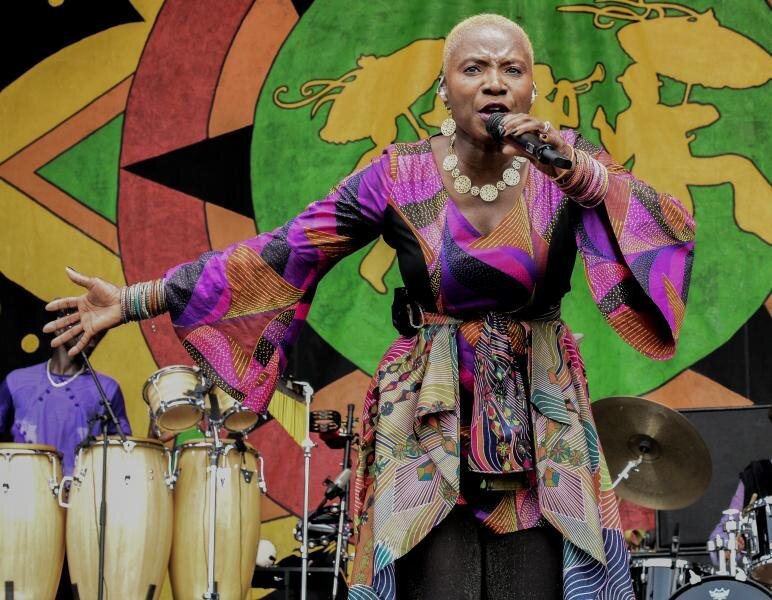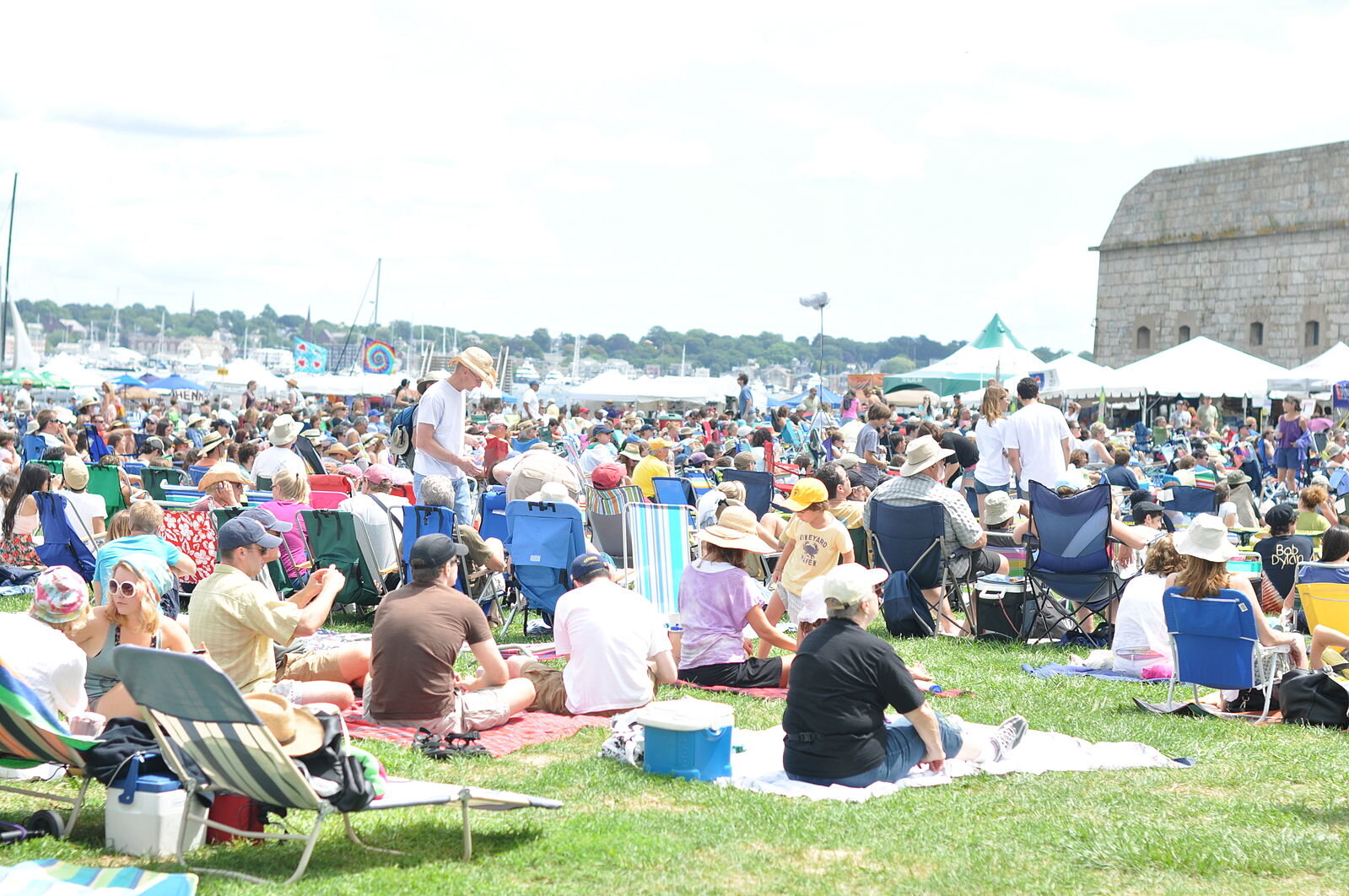The New Orleans Fall Festival Season Tipsheet

A$AP Rocky at Buku 2019
New Orleans’ major music festivals have all moved into October. What challenges other than COVID-19 do they have to deal with? Who’s best positioned to have things work out?
The combination of vaccines crawling into the world and New Orleans’ festivals announcing their move to October has sparked some optimism that we will actually get a Jazz Fest, French Quarter Fest, Buku and Voodoo in 2021. We’ve been here before though, so the rush to October should be seen less as an expression of probability and more as staking out space on the New Orleans calendar. Last week, Coachella and Stagecoach canceled their spring 2021 dates without announcing when or if they plan to reschedule, and in England, Glastonbury canceled as well.
So assuming the festivals will take place, what challenges do they face? Every producer faces the same basic questions—Will you have an audience, will you have talent, and can it be done safely? Or safely-ish. The third question gets a lot of attention, and that’s one I have to give everybody a pass on for now because there are simply too many moving parts. The state of the pandemic in the fall will have a lot to say about what counts as safe, and the specific plans producers institute will affect things as well. That said, if there’s beer, there will be the occasion for spread. Even people who try to maintain social distancing end up too close as the day and drink wear on. And since there will be beer, there will be spread.
That said, the audience and the talent are at least as crucial if not more so since they’ll have a lot to say about whether or not a festival is economically viable. Here’s my reading of the situation with the festivals ranked from least to most challenged.
1. French Quarter Festival presented by Chevron
September 30-October 3
French Quarter Festival has a lot in its favor starting with it’s free and the talent’s local. Even those who have taken financial hits during the pandemic can afford free, and musicians in South Louisiana are easily mobilized and available. Because the talent is local, French Quarter Festival won’t face the payrolls that Jazz Fest and Voodoo will. In the past, the sheer number of acts drove up the talent costs, but since the festival has already said that it be a trimmer event considering the circumstances, so it should be financially feasible for producers and sponsors to pay for the musicians.
French Quarter Festival will also benefit from being first. All of the festivals will require some adjustments for a (post?-)pandemic situation, but the wave of excitement and energy surrounding the House Floats idea suggests that New Orleans will be ready to show up for whatever French Quarter Fest can arrange.
2. Buku Music + Art Project
October 22-23
The electronic dance music festival benefits from its limited duration—two days—which will help cut costs, and its younger audience, which acts like it’s bulletproof. The Electric Daisy Carnival in Las Vegas sold out three days in May when tickets went on sale last September without announcing a single act or vaccine, so it’s reasonable to expect that Buku will be able to draw enough of crowd. Young people are always surprising in their access to money, so there’s no reason to think the economy will hurt Buku much.
By calling this year’s event “Buku: Planet B” and describing it as “an immersive, one-time-only alternative take on Buku,” the promoters have signaled that it won’t be business as usual and lowered the audience’s expectations. The emphasis on the experience suggests that promoters will put money into the part of Buku they can control—the production—and not depend on top-line talent being available in October. Since the party does a lot of the selling at Buku, the pressure to put some star power on the stage is likely diminished.
3. The New Orleans Jazz and Heritage Festival presented by Shell
October 8-10, October 15-17
It’s hard to bet against Jazz Fest. 2006 showed that the festival can adapt to less than optimum circumstances, and producer Quint Davis has enough contacts and resources to make something happen—likely something bigger than you might think possible. Jazz Fest will be helped by being one of New Orleans’ two biggest events of the year along with Mardi Gras, so there are a lot of constituencies that want to help it take place. The odds of Jazz Fest succeeding are helped by a loyal fan base and a heavy reliance on Louisiana talent that is ready and eager to play.
Still, it faces a few meaningful challenges. Its audience skews older, and COVID-19 affects older people more seriously. Jazz Fest isn’t cheap for tourists, and the state of the economy will force some people to reconsider whether this is the year they return to Jazz Fest, and if they do, how do they do it? Can they still afford to see it wall to wall like they otherwise might, or do they have to pick their weekend? Jazz Fest isn’t cheap for locals either, and the more casual festgoer who attends once or twice a year to see specific headliners may decide that they don’t have the money for it this year. Or, they decide that concern about the Coronavirus makes them sit a year out.
For Jazz Fest and most of these festivals, the faithful don’t make festivals profitable. The lineups make the difference, and the festivals need the casual fans who show up for a Who or an Elton John or a Keith Urban who otherwise wouldn’t be there at all. Can Jazz Fest book a few of those people in the current, uncertain climate?
Jazz Fest will also face some choices. 2020’s lineup featured Lizzo as a headliner, and it periodically aims for Gen X’ers or younger. Can that be a priority in a year where it will face virtual head-to-head competition with Voodoo? Jazz Fest has to deal with the headliner question because an all-local Jazz Fest may be a diehard’s dream, but it is also an expensively ticketed French Quarter Fest. One of the big questions is whether headline-calibre talent will be ready to tour by early October because artists are rarely coming to Jazz Fest to play a single gig. Davis’ Contacts likely include some artists who would play a one-off show at Jazz Fest, but usually New Orleans is one stop on a tour. That means the acts need to rev up their touring machines and book tours, which can certainly happen, but it doesn’t happen as quickly as you might think. It also means that the country, not just the city, needs to be far enough along in COVID management that other cities can book concerts as well.
4. Voodoo Music + Arts Experience
October 29-31
Voodoo faces a lot of challenges in 2021. It has largely been overlooked in the recent festival conversation because it simply stayed put on the Halloween weekend while everybody else made news by moving to the weekends in front of it. Now though, New Orleans has four weekends of festivals leading up to Voodoo including Buku immediately before it. That raises the prospect of festival fatigue, and it’s a fair question whether the house and techno audiences have the stamina and money for back to back festival weekends. Young people are surprisingly financially and constitutionally resilient, but are they resilient enough for Buku and Voodoo on successive weekends?
One answer would be to return to a rock-first footing, but in recent years, the crowd at the Le Plur electronic dance music stage was consistently larger than the one for rock bands. It’s not clear that the market for rock will be economically viable, and like Jazz Fest, Voodoo has to find headliners capable of drawing enough fans to fill small pastures. Will those artists be out there, and will they be at a price that Voodoo can afford in such uncertain circumstances? Voodoo has a lot of uncertainties to factor in as it plans its 2021 edition.
Creator of My Spilt Milk and its spin-off Christmas music website and podcast, TwelveSongsOfChristmas.com.






